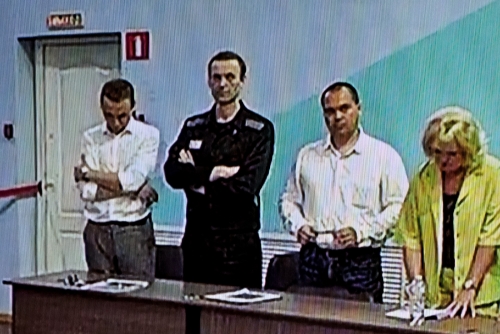Russia jails Navalny for 19 years on extremism charges
AFP | Melekhovo
The Daily Tribune – www.newsofbahrain.com
Russia on Friday handed jailed opposition leader Alexei Navalny 19 years behind bars on extremism charges in what he said was a Kremlin bid to deprive ordinary people of "the will to resist".
The heavy sentence against Navalny, who had mobilised the largest protests against President Vladimir Putin, comes amid a historic crackdown on dissenting voices as Moscow's assault on Ukraine stretches into its second year.
In a statement posted on Facebook, Navalny, who was sentenced to 19 years at a "special regime" penal colony, urged Russians to keep up the fight.
"They want to frighten you, not me, and deprive you of the will to resist," he said.
"You are being forced to surrender your Russia without a fight to a gang of traitors, thieves and scoundrels who have seized power.
"Don't lose the will to resist."
Special regime penal colonies are jails with the strictest conditions of imprisonment reserved for Russia's worst criminals including terrorists and serial killers.
AFP journalists watching the court session in a press centre at Navalny's prison said the 47-year-old looked emaciated but relaxed.
He smiled as the judge read the verdict and hugged another defendant before the grainy transmission cut.
A masked law enforcement officer in grey camouflage gear and a flak jacket stood in front of the audience room.
Navalny's spokeswoman Kira Yarmysh told AFP that the new sentence will take into account the around two and a half years the politician had already served as well as a 10-month house arrest in 2014-2015.
"The number of years does not matter," Navalny said.
"I perfectly understand that, like many political prisoners, I am serving a life sentence. Where life is measured by the length of my life or the longevity of this regime."
He was arrested and jailed in 2021 after arriving in Moscow from Germany, where he had been recovering from a poisoning attack he blames on the Kremlin, one which sparked international condemnation.
- Behind closed doors -
The trial has been held behind closed doors at the IK-6 penal colony, a maximum-security prison some 250 kilometres (155 miles) east of Moscow, where Navalny is jailed.
A few dozen people travelled to Melekhovo to support the jailed opposition leader.
One of the supporters, Denis, said the harsh verdict did not surprise him.
"It was obvious given our justice system," said the 36-year-old engineer from Moscow, who declined to give his last name.
He called Navalny a "symbol of the fact that we have a different future, we have a different path".
Before his new conviction, Navalny was serving a nine-year sentence in a maximum-security prison for "embezzlement", a charge his supporters say was trumped up in retaliation for challenging Putin.
The United States called Navalny's sentencing "an unjust conclusion to an unjust trial".
Germany slammed the ruling as "pure injustice", an EU chief denounced the verdict as "unacceptable", and the UN rights head urged Russia to release the jailed opposition politician "immediately".
Britain too called for Navalny's immediate release.
- 'Trying to intimidate' -
Navalny had said on Thursday he expected the court to hand him a lengthy, "Stalinist" prison sentence.
"Please consider and realise that by jailing hundreds, Putin is trying to intimidate millions," he said.
Navalny has built a huge following on social media, where he has posted videos exposing alleged corruption among Russia's elite and mobilised massive anti-government protests.
Prosecutors said Navalny created an organisation that undermined public security by carrying out "extremist activities".
His Anti-Corruption Foundation, which investigates graft among Russian officials, was banned for extremism in 2021.
Most of his close allies have fled the country.
Since launching full-scale hostilities against Ukraine last year, Moscow has ramped up its crackdown on critics, pushing top members of the country's beleaguered opposition abroad.
Navalny's last days before the verdict were spent in a punishment cell where he has been regularly sent for minor infringements of prison rules, according to his team.
- Severe penal colony -
Navalny said prison officials had forced him to share a cell with a sickly inmate and subjected him and other prisoners to "torture by Putin", making them listen to the Russian president's speeches.
He has also complained of health problems and major weight loss since being jailed.
In April, Navalny said he could be separately judged over terrorism charges and face life in prison.
His campaign offices around the country were declared extremist organisations in 2021 by authorities, putting employees, volunteers and supporters at greater risk of prosecution.
Over the summer two heads of regional offices, Lilia Chanysheva and Vadim Ostanin, were sentenced to seven-and-a-half and nine years respectively on extremism charges.
Thousands of Russians have been detained for protesting Moscow's offensive in Ukraine. Some of the highest-profile activists including Vladimir Kara-Murza and Ilya Yashin are now behind bars.
Related Posts

